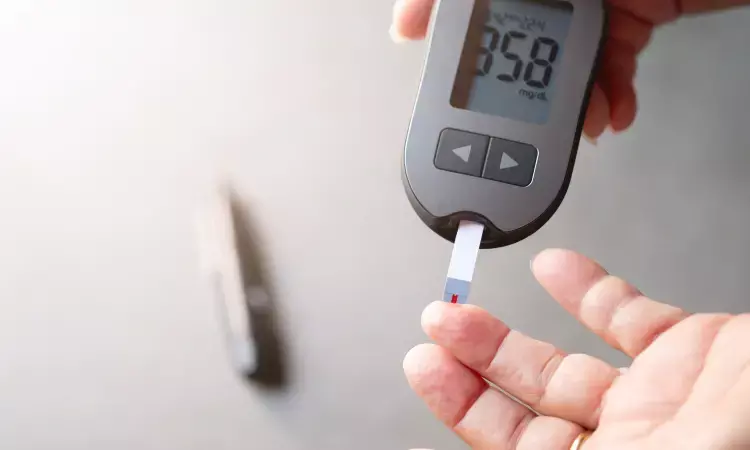- Home
- Medical news & Guidelines
- Anesthesiology
- Cardiology and CTVS
- Critical Care
- Dentistry
- Dermatology
- Diabetes and Endocrinology
- ENT
- Gastroenterology
- Medicine
- Nephrology
- Neurology
- Obstretics-Gynaecology
- Oncology
- Ophthalmology
- Orthopaedics
- Pediatrics-Neonatology
- Psychiatry
- Pulmonology
- Radiology
- Surgery
- Urology
- Laboratory Medicine
- Diet
- Nursing
- Paramedical
- Physiotherapy
- Health news
- Fact Check
- Bone Health Fact Check
- Brain Health Fact Check
- Cancer Related Fact Check
- Child Care Fact Check
- Dental and oral health fact check
- Diabetes and metabolic health fact check
- Diet and Nutrition Fact Check
- Eye and ENT Care Fact Check
- Fitness fact check
- Gut health fact check
- Heart health fact check
- Kidney health fact check
- Medical education fact check
- Men's health fact check
- Respiratory fact check
- Skin and hair care fact check
- Vaccine and Immunization fact check
- Women's health fact check
- AYUSH
- State News
- Andaman and Nicobar Islands
- Andhra Pradesh
- Arunachal Pradesh
- Assam
- Bihar
- Chandigarh
- Chattisgarh
- Dadra and Nagar Haveli
- Daman and Diu
- Delhi
- Goa
- Gujarat
- Haryana
- Himachal Pradesh
- Jammu & Kashmir
- Jharkhand
- Karnataka
- Kerala
- Ladakh
- Lakshadweep
- Madhya Pradesh
- Maharashtra
- Manipur
- Meghalaya
- Mizoram
- Nagaland
- Odisha
- Puducherry
- Punjab
- Rajasthan
- Sikkim
- Tamil Nadu
- Telangana
- Tripura
- Uttar Pradesh
- Uttrakhand
- West Bengal
- Medical Education
- Industry
Fasting Blood Sugar variability tied to increased mortality among Heart Transplant Patients

A new study has found that fasting blood glucose (FBG) variability is strongly linked to an increased risk of all-cause mortality in heart transplant recipients pointed out a study published in the Clinical Transplantation Journal.
FBG variability is linked to cardiovascular events and mortality, but its association with heart transplant recipient mortality is unclear.
The study, which was a retrospective cohort study, included 373 adult recipients who had survived for at least one year after heart transplantation with a functioning graft and had their FBG measured more than three times within the first year after transplantation.
The patients were categorized into three groups according to the coefficient of variation of FBG level, with those with higher FBG variability having a significantly increased risk of all-cause mortality.
The study concluded with the following clinical findings:
- During a median follow-up of 44.4 months, 31 participants (8.3%) died, and the FBG variability was found to be independently associated with increased all-cause mortality.
- Patients with higher FBG variability had a significantly increased risk of all-cause mortality.
- The association remained unchanged after adjusting for various factors such as demographics, cardiovascular history and lifestyle, hospital information, immunosuppressive therapy, and post-transplant renal function.
The results of the study have important implications for heart transplant recipients, as they suggest that FBG variability may be a novel risk factor and prognostic marker for these patients in the outpatient clinic.
“It is important for physicians to be aware of this finding, as it could lead to more targeted interventions and improved outcomes for heart transplant patients. This finding is particularly relevant for heart transplant patients, as they often have pre-existing cardiovascular disease and are at increased risk of cardiovascular events.” added the researchers of the study.
Reference:
Zheng, Qiang, et al. "Association of Fasting Blood Glucose Variability With All-cause Mortality in Heart Transplant Recipients." Clinical Transplantation, 2023, pp. e14958.
Dr. Mahalakshmi Sivashankaran joined Medical Dialogues as an Intern in 2023. She is a BDS graduate from Manipal College of Dental Sciences, Mangalore Batch 2022, and worked as a Junior Resident at VMMC & Safdarjung Hospital at the Department of Dental Surgery till January 2023. She has completed a Diploma in Executive Healthcare management from the Loyola Institute of Business Administration, developing skills in Healthcare Management and Administration. She covers several medical specialties including Dental, ENT, Diagnostics, Pharmacology, Neurology, and Cardiology.
Dr Kamal Kant Kohli-MBBS, DTCD- a chest specialist with more than 30 years of practice and a flair for writing clinical articles, Dr Kamal Kant Kohli joined Medical Dialogues as a Chief Editor of Medical News. Besides writing articles, as an editor, he proofreads and verifies all the medical content published on Medical Dialogues including those coming from journals, studies,medical conferences,guidelines etc. Email: drkohli@medicaldialogues.in. Contact no. 011-43720751


